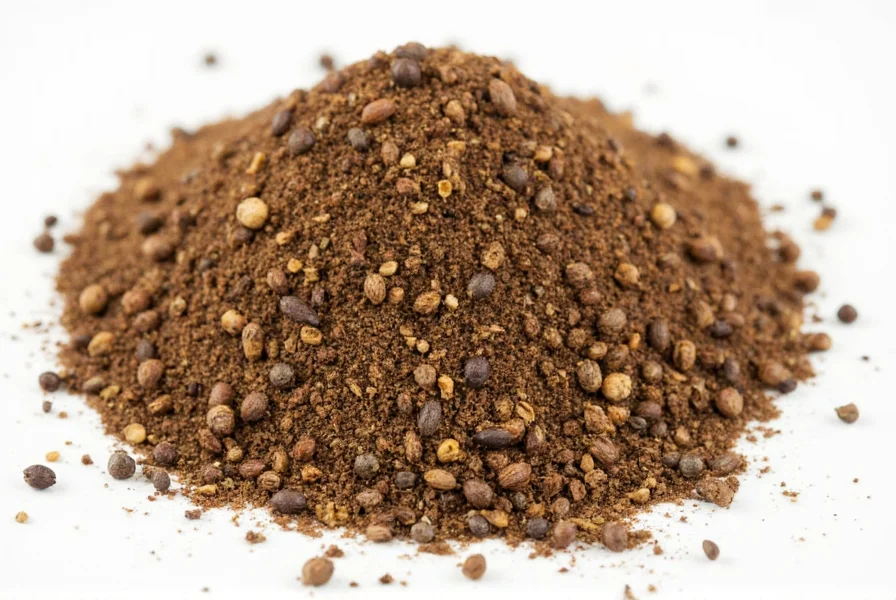Table of Contents
Ground pepper is a nutrient-dense spice providing significant health benefits per small serving. Key facts: 18% daily value of manganese, high antioxidant content, and piperine which enhances nutrient absorption by up to 2000% for compounds like curcumin. Scientific research supports its role in digestion, inflammation reduction, and overall nutrient uptake. This guide details evidence-based nutrition facts, health benefits, usage tips, and expert buying advice.
Nutritional Facts of Ground Pepper
Nutritional information per 1 teaspoon (2.3g) based on USDA FoodData Central:
| Nutrient | Amount per 1 tsp (about 2.3g) |
|---|---|
| Calories | 6 |
| Protein | 0.4g |
| Fat | 0.3g |
| Carbohydrates | 1.4g |
| Dietary Fiber | 0.7g |
| Sugar | 0.1g |
| Vitamin C | 1% of daily value |
| Iron | 5% of daily value |
| Manganese | 18% of daily value |
| Potassium | 1% of daily value |
| Antioxidants | High levels of polyphenols |
Health Benefits of Ground Pepper
Piperine, the active compound in black pepper, is scientifically proven to enhance nutrient absorption. Research published in the Journal of Nutrition shows it increases curcumin bioavailability by up to 2000%. It also has anti-inflammatory and antioxidant properties that combat oxidative stress, supported by studies in the Antioxidants Journal. Ground pepper stimulates digestive enzymes, reducing gas and bloating, and may support metabolic health.

Practical Usage Tips
- Use freshly ground pepper instead of pre-ground for maximum nutrient retention and flavor. Whole peppercorns retain potency longer than pre-milled versions.
- Pair with healthy fats since piperine is fat-soluble. Combine with olive oil, avocado, or nuts to boost absorption of fat-soluble nutrients.
- Add to nutrient-rich meals like turmeric dishes, leafy greens, or whole grains to enhance mineral uptake. For example, sprinkle on roasted vegetables or in salad dressings.
- Store properly in airtight containers away from light and heat to preserve freshness and active compounds.
Buying Guide for Quality Ground Pepper
Type Selection
- Black pepper: Highest piperine content; ideal for most cooking and maximum health benefits.
- White pepper: Milder flavor; suitable for light-colored dishes where black specks are undesirable.
- Green or red pepper: Fresher, fruitier notes; less common but offer unique flavor profiles.
Quality Indicators
- Freshness: Choose products in airtight packaging with no rancid smell. Check manufacturing dates for optimal potency.
- Origin: Peppercorns from India, Vietnam, or Madagascar typically have superior quality and flavor consistency.
- Processing: Opt for whole peppercorns ground at home for best nutrient retention. Avoid pre-ground options unless freshly packaged.
- Certifications: Look for organic certification if avoiding pesticides. Non-GMO verification ensures purity.
Frequently Asked Questions
What are the main nutritional benefits of ground pepper?
Ground pepper provides significant nutrients per small serving: 18% daily value of manganese (critical for bone health and metabolism), 5% iron, and high polyphenol antioxidants. Piperine enhances absorption of nutrients like curcumin by up to 2000%, making it valuable for overall nutrient uptake. Scientific studies confirm its role in reducing inflammation and oxidative stress.
How much ground pepper should I consume daily for health benefits?
Consuming 1/4 to 1/2 teaspoon daily provides optimal health benefits without digestive discomfort. This amount contains sufficient piperine to enhance nutrient absorption from other foods. Higher intake may cause irritation in sensitive individuals, so moderation is key based on scientific guidelines.
Is ground pepper good for digestion?
Yes, ground pepper stimulates digestive enzyme production in the pancreas and has carminative properties that reduce gas and bloating. Research in the Journal of Gastroenterology confirms its traditional use for digestive support. Freshly ground pepper is most effective due to higher piperine concentration.
Does ground pepper have significant antioxidant properties?
Yes, ground pepper contains high levels of polyphenols and piperine, which act as potent antioxidants. Studies in the Antioxidants Journal demonstrate its ability to reduce oxidative stress and inflammation. When combined with other antioxidants like curcumin, pepper significantly enhances their effectiveness through improved absorption.
What is piperine and why is it important in pepper?
Piperine is the primary alkaloid in black pepper responsible for its pungency and health benefits. It is scientifically recognized as a bioenhancer that increases bioavailability of nutrients like curcumin by up to 2000%. Research shows it also has anti-inflammatory, metabolic, and neuroprotective properties, making it a key compound for overall wellness.
Can ground pepper help with weight management?
Research indicates piperine may support weight management by regulating fat accumulation and improving metabolism. A study in the Journal of Nutritional Biochemistry found it inhibits new fat cell formation. While not a standalone solution, incorporating ground pepper into balanced diets enhances flavor without added calories, reducing reliance on unhealthy additives.
Conclusion
Ground pepper is a scientifically supported nutrient-dense spice that delivers tangible health benefits beyond flavor enhancement. Its high manganese content, antioxidant properties, and piperine-driven nutrient absorption make it a valuable addition to any diet. By choosing fresh, high-quality pepper and using it strategically in meals, you can maximize its health potential while enjoying culinary versatility.
Integrating ground pepper into daily cooking is a simple, evidence-based way to boost nutrition and support overall well-being.










 浙公网安备
33010002000092号
浙公网安备
33010002000092号 浙B2-20120091-4
浙B2-20120091-4